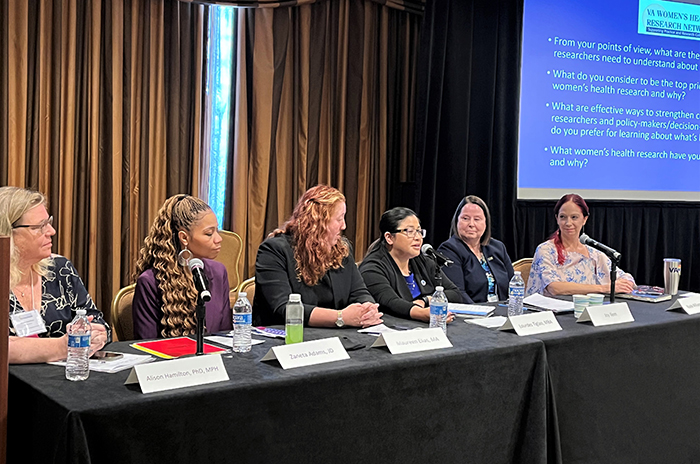Office of Research & Development |
 |
Office of Research & Development |
 |


In a VA study, women and men who had experienced military sexual trauma were at increased risk of recent suicidal thoughts. (Photo for illustrative purposes only: ©iStock/Juanmonino)
December 17, 2021
By Nancy Volkers
VA Research Communications
A history of military sexual trauma is associated with an increased risk of recent suicidal thoughts in Veterans without a mental health diagnosis or mental health treatment history, according to a study of more than 40,000 post-9/11 Veterans.
“We often study suicide and suicidal ideation—thoughts about suicide—in people who are already getting mental health care,” said Dr. Suzanne E. Decker, first author of the study. “My colleagues and I were interested in examining risk factors for suicidal ideation in Veterans not yet connected to mental health care, because this group might have needs we don’t know about.
"Preventing suicide is an important goal, and to prevent a behavior, you have to understand it."
“Preventing suicide is an important goal, and to prevent a behavior, you have to understand it,” said Decker, a psychologist at VA Connecticut Healthcare System and assistant professor at Yale School of Medicine. At VA, she works with the New England Mental Illness Research, Education, and Clinical Center and the Pain Research, Informatics, Multi-morbidities, and Education Center.
The researchers examined VA data on 41,658 Veterans (12.3% women) who had been screened for both military sexual trauma (MST) and suicidal ideation between 2008 and 2013, and who had no prior mental health visits or antidepressant medications in their electronic medical record.
MST was reported by 27.9% of women and 2.9% of men. Screening for military sexual trauma was done using the VHA two-item screener, which asks: "While you were in the military … a) Did you receive uninvited and unwanted sexual attention, such as touching, cornering, pressure for sexual favors, or verbal remarks?; b) Did someone ever use force or threat of force to have sexual contact with you against your will?” A “yes” answer to either or both questions was considered a positive screen.

VA Researcher Named One of U.S.’ Top Female Scientists

2023 VA Women's Health Research Conference

Self-harm is underrecognized in Gulf War Veterans
Recent suicidal thoughts were reported by 14.7% of women and 16.5% of men. This was screened using item 9 on the PHQ-9, a standard depression screening tool. Item 9 asks: “Over the past two weeks, how often have you been bothered by thoughts that you would be better off dead, or of hurting yourself in some way?” Any response other than “Not at all” was recorded as a positive screen.
Overall, said Decker, “About 1 in 6 Veterans had suicidal ideation in the past 2 weeks. That’s a higher percentage than we expected. It speaks to the importance of checking in with people about how they're doing, whether or not they are engaged in mental health care.”
Women who had experienced MST were at a 65% increased risk of recent suicidal thoughts, compared with women who had not. Comparatively, men who had experienced MST were at a 49% increased risk of recent suicidal thoughts.
Among Veterans, the death rate from suicide are higher in men but risk for a suicide attempt is higher in women, a pattern that is consistent with the general population. MST appears to be a strong risk factor for suicidal thoughts and behavior in post-9/11 Veterans, but some research suggests Veterans of this era, as well as female MST survivors, often don’t receive or engage with recommended mental health treatment.
“The VA has a robust system for screening and referrals,” said Decker. “But there are still people who aren’t engaged with care and could benefit from it.”
The rich dataset and well-established screening tools mean that the results are relatively solid. But some questions remain. For one, said Decker, these older medical records did not systematically include information on sexual orientation or gender identity. A future study, led by senior author Joseph Goulet, is leveraging natural language processing to analyze the records for this information, in hopes of seeing how gender and sexual identity relate to suicide and its risk factors.
“Typically, and unfortunately, people who are a sexual or gender minority often experience additional discrimination and other challenges that are linked with risk for suicidal behavior,” said Decker.
The study results suggest continued vigilance toward examining barriers to mental health care, as well as expanding care for Veterans.
“If 1 in 6 Veterans have depression symptoms [specifically, suicidal thinking, in this case] but aren’t receiving mental health care, we have a problem,” Decker said. “We need to get these Veterans the support they deserve, whether that is mental health care or something else.”
A positive screen for suicidal ideation results in a conversation with the provider to explore how the person is feeling and whether they might be a risk to themselves.
“There is a referral, but also a conversation about what is going on,” said Decker. “For people who don’t want to engage in mental health care, we need to help them stay safe. We’d like to help them understand barriers to care, as well as ask about other ways we can help them if they don’t want to start counseling.”
One study found that about 70% of people with suicidal ideation acted on it within one hour. Therefore, if the means to inflict harm can be removed from the equation, or made less immediately accessible, suicide risk is reduced. One example is removing firearms from the house in certain cases, or at least ensuring they are kept locked and unloaded as appropriate. Another is discouraging the stockpiling of pain drugs or other medications. This form of risk reduction is called lethal means safety training.
Suicidal ideation can be associated with many mental health concerns, said Decker, including PTSD, depression, and bipolar disorder.
“A referral to some counseling and/or medication management is a great start,” she said. “Then, whoever is managing that treatment can help figure out what challenges the person is experiencing and what might be the best things for them to try from a menu of all available options.”
Past studies have linked military sexual trauma with depression, PTSD, risk-taking behaviors, and suicidal ideation. “But people can lead a healthy joyful life after trauma,” Decker said. “Care is provided to Veterans free of charge, and it’s matched to each person’s needs. We want to be available and provide support to all Veterans who are struggling with this.”
If you are in crisis or having suicidal thoughts, the Veterans Crisis Line offers support 24 hours a day, 7 days a week:
Call 1-800-273-8255 and press 1
Text 838255
Start a confidential online chat: www.veteranscrisisline.net/get-help/chat
The American Foundation for Suicide Prevention also offers phone and text options: afsp.org/get-help
Evidence-based therapies offered in VA: www.mentalhealth.va.gov/get-help/treatment/ebt.asp
Find a VA location near you: www.va.gov/find-locations/
VA Research Currents archives || Sign up for VA Research updates